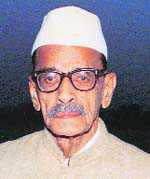THE imposition of Emergency in the country by Indira Gandhi 41 years ago saw most prominent opposition leaders behind bars, and most of the Congress leaders meekly bowing to the will of Gandhi. However, there were a few, including veteran Congress leader Gulzari Lal Nanda, who even then dared to oppose this move.
Nanda, who played a pivotal role in the creation of a separate state of Haryana when the Akalis were demanding a ‘Punjabi Suba’, was conferred the title of Bharat Ratna posthumously during the period I.K. Gujral was the Prime Minister.
Indira Gandhi had good regard for Nanda as he was instrumental in her becoming prime minister. Nanda became interim prime minister for the second time after the death of Lal Bahadur Shastri in 1965, but opted out of the race when Gandhi wanted to contest for the post of the Congress Parliamentary Party leader against Morarji Desai.
On this Emergency anniversary, an incident that demonstrates the terror prevailing at that time and the firm stand taken by Nanda comes to my mind. It was on July 4, 1975, birthday of Nanda, that I took late Dr Shanti Swaroop Sharma (a freedom fighter), late Devi Dayal Nanha (journalist), Lala Naurata Ram and my late father Dharambir Sabharwal, who were close associates of Nanda in his parliamentary constituency of Kurukshetra, in my car to his residence in Delhi. We reached in the morning to pay our best wishes to Nandaji. He came out to meet us in the small office in the lawns just opposite to the main door of the building.
While he was discussing some issues regarding the development of Kurukshetra, his personnel secretary Balraj Puri informed us that there was a call from the Prime Minister’s residence. Nanda picked up the telephone and said, “Thank you for the best wishes”. After listening for a while more, he told the caller: “Convey my thanks to Indiraji and tell her there is no need to come here personally to wish me.” When the caller persisted, Nanda repeated emphatically, “No, no, there is no need!”
After putting down the phone, Nanda disclosed that Gandhi had wanted to come and wish him personally but that he had refused. Just a minute or so later there was another call from the PM House. The caller said that Gandhi had expressed her resolve to visit Nanda and that she would be starting for his residence within the next few minutes. Nanda was furious and asked, “When I am making it clear that there is no need for this, why is she coming here?”
Despite our efforts to try and pacify him, Nanda was quite tense. He rushed in to the house to inform his wife Gandhi’s visit. Meanwhile, a large contingent of police descended on Nanda’s residence. The security cover was very heavy as Gandhi was moving out of her house for the first time after the imposition of Emergency. One officer entered Nanda’s office and directed that we move into a small room at the rear from where nothing was visible outside. Dr Shanti Swaroop Sharma began to argue with the officer pointing out that the room was extremely dingy.
Meanwhile, Nanda returned and inquired what the matter was. When the officer informed him about his directions to us, Nanda became furious and said it was his house and nobody could dishonour his guests in such a manner. The officer immediately apologised and allowed us to remain seated where we were.
Nanda received Indiraji at the door and both of them, along with R.K. Dhawan, went inside the house. They came out after about 25 minutes.
Upon returning to rejoin us in the office after seeing off Gandhi, Nanda appeared to be significantly relieved. He narrated in detail to us the conversation that had taken place between him and Gandhi. He disclosed that Gandhi had explained the conditions that had forced her to take the extreme step of imposing Emergency and requested him to issue a statement in support of it, as was being done by other political leaders.
However, Nanda refused to appreciate her actions in this regard, instead pointing out that a large number of freedom fighters, including her father Jawahar Lal Nehru, had suffered a great deal to achieve freedom and democracy for the country. In fact, he criticised the “cleanliness operation” started in various parts of Delhi, especially Karol Bagh. He told Gandhi that “we do not have to make Delhi a Paris, instead take steps to provide livelihood to the people. By throwing out ‘rehriwallahs’ (hawkers) or roadside vendors, we are making them jobless.”
After a few days, the latter part of the conversation between the two leaders regarding throwing out of ‘rehriwallas’ appeared in a few vernacular papers but Nanda’s obvious displeasure at the Emergency and his outright rejection of Gandhi’s actions was not highlighted, possibly due to restrictions on the media.
Nandaji shifted to Kurukshetra and tried to remain there for most of the time during the period of the Emergency, keeping himself busy with projects like the restoration of the Brahmasarovar, which even today is the pride of this town. During this period many senior Congressmen came here to the city to hold talks with Nandaji, but he refused to have anything to do with the Emergency and, in fact, highlighted the atrocities being brought to his notice.
He resigned from the Congress and many of his associates in Kurukshetra deserted the party at that time. He even refused to contest the parliamentary elections after the lifting of the Emergency. Later, Nanda was always proud to narrate how he never supported the Emergency despite the odds.
The writer is a veteran journalist.
Unlock Exclusive Insights with The Tribune Premium
Take your experience further with Premium access.
Thought-provoking Opinions, Expert Analysis, In-depth Insights and other Member Only Benefits
Already a Member? Sign In Now











